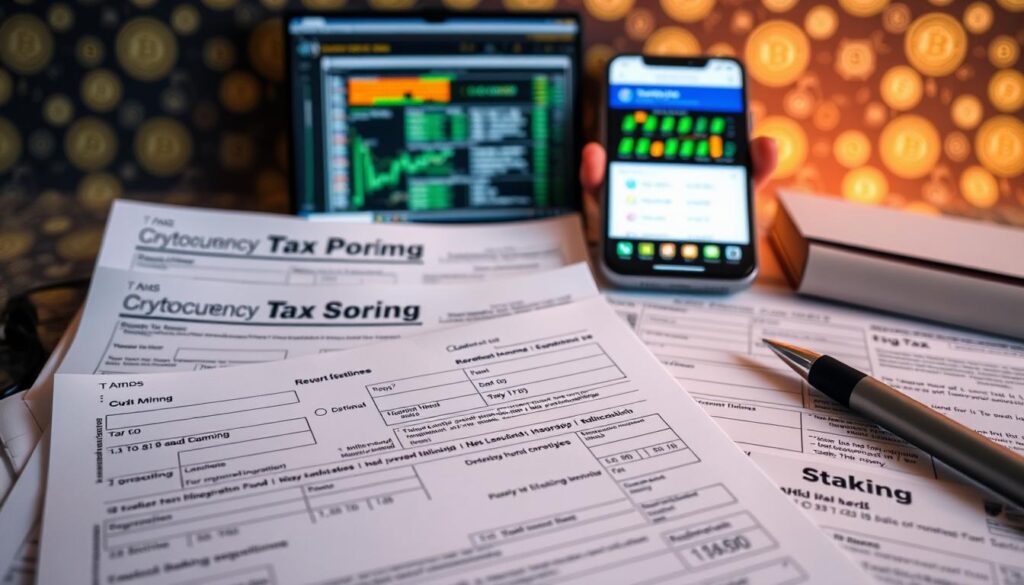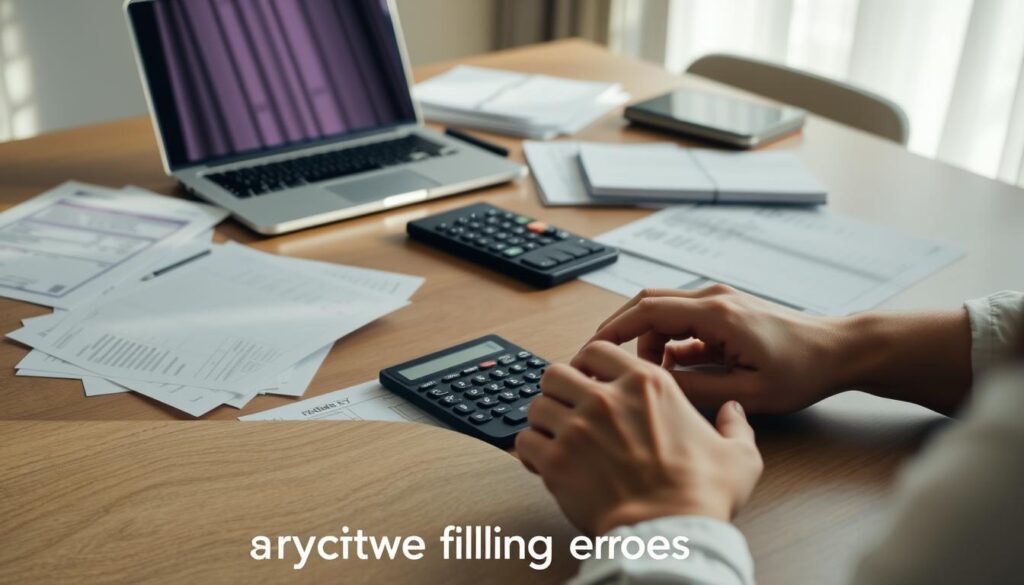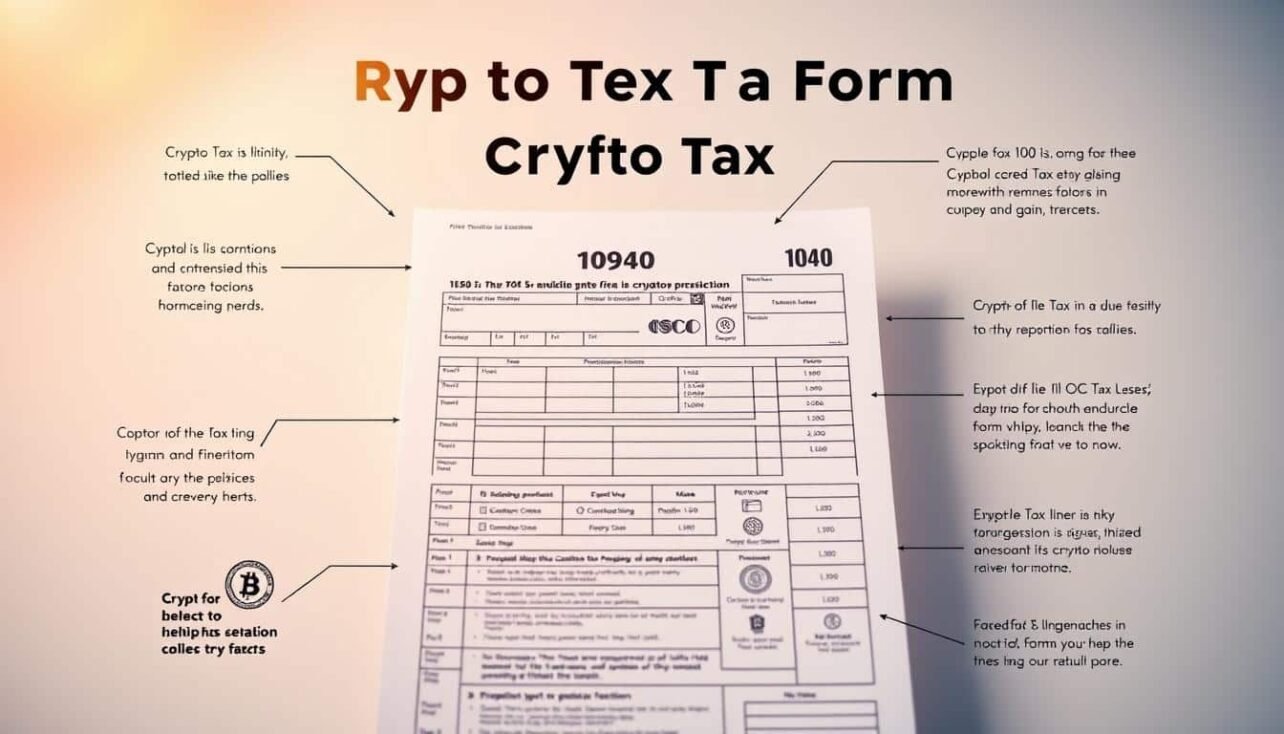Understanding crypto tax forms is key to following IRS rules for digital assets. This guide helps simplify the process for U.S. taxpayers. It covers how to report trades in Bitcoin, Ethereum, and more to avoid penalties.
The IRS views cryptocurrency as property. This means you need to use Form 8949 and Schedule D for gains or losses. This article will walk you through each step, from tracking trades to filing correctly. Learn which forms you need for sales, mining, or staking.
Key Takeaways
- U.S. taxpayers must report crypto transactions on IRS forms like Form 8949 and Schedule D.
- Misreporting crypto gains can lead to audits or fines under IRS guidelines.
- Understanding crypto tax forms explained requires tracking buy/sell dates, prices, and transaction IDs.
- Tools like crypto tax software automate form preparation for accuracy.
- Failure to report crypto profits violates IRS rules even for small trades.
The Fundamentals of Cryptocurrency Taxation
Getting started with cryptocurrency tax reporting means understanding what the IRS calls digital assets. Since 2014, the IRS has seen cryptocurrencies like Bitcoin as property, not money. This means every action with crypto, like trading or staking, has tax implications. You must track each transaction, even when swapping one crypto for another.
How the IRS Classifies Cryptocurrency
Since crypto is seen as property, it follows the rules of capital gains. Selling Bitcoin for USD or swapping Ethereum for Litecoin is taxed like stock sales. Important points include:
- Every crypto-to-crypto exchange creates a taxable event.
- Receiving crypto as payment counts as income.
- Mining or staking generates taxable ordinary income.
Basic Tax Principles Applied to Digital Assets
It’s crucial to keep track of cost basis and how long you hold it. Gains from selling within a year are taxed more than those held longer. Keeping detailed records of every trade is essential for accurate tax reporting. Not reporting correctly can lead to audits.
Capital Gains vs. Ordinary Income in Crypto
Selling crypto for a profit results in capital gains. Getting crypto as income, like mining rewards, is taxed as ordinary income at higher rates. Both types need detailed documentation. For example, trading Ethereum for Dogecoin is a capital gain/loss, while mined Bitcoin is taxed as earned income.
Key IRS Crypto Tax Forms Explained
Knowing which IRS cryptocurrency tax forms you need is key. These digital asset tax forms help you report crypto activities right. Start by tracking all trades and income with these forms.
Form 8949 tracks every crypto sale or trade. You need to list the date, cost, and gains or losses for each. This makes sure you’re ready for audits.
Schedule D sums up Form 8949 data. It calculates your net capital gains. This form is part of your tax return, showing crypto’s impact on your income.
Schedule 1 deals with non-trade crypto income. This includes mined coins, airdrops, or staking rewards. Even if you didn’t sell, these are taxable.
Form 1040 asks if you’ve had virtual currency transactions. A “yes” means you must attach other IRS cryptocurrency tax forms. Getting this wrong can lead to audits.
Use crypto tax software to fill out forms like Form 8949 and Schedule D. Double-check that all numbers match. If you’re unsure about complex activities, talk to a tax expert.
The Crypto Tax Reporting Timeline
Crypto tax reporting needs strict deadlines. Unlike traditional investments, crypto investors must track every transaction. Start preparing by December to avoid last-minute stress. The IRS expects accurate records and timely submissions of virtual currency tax forms like Form 8949 and Schedule D.
- December: Gather all exchange statements. Log every trade, airdrop, or staking reward. Use tools to export transaction data.
- January–March: Calculate gains/losses using FIFO/LIFO methods. Review Form 8949 instructions to classify transactions correctly.
- April 15: File Form 1040 with attached virtual currency tax forms. Late filers risk penalties; extensions delay deadlines but require estimated payments.
Quarterly estimated tax payments apply to crypto traders earning over $1,000 monthly. Missing payments may incur underpayment penalties. Extensions (applied by October 15) give extra time but require prepayment of estimated taxes. Keep records at least six years—IRS audits for crypto often extend beyond standard three-year limits.
Pro tip: Use tax software to auto-calculate cost basis and generate forms. Stay proactive to meet all crypto tax reporting requirements.
How to Document Cryptocurrency Transactions for Tax Purposes
Keeping accurate records is key to following cryptocurrency tax reporting rules. You must track every detail to dodge IRS fines. Begin by logging important information and use solid systems to keep your records in order.
Essential Transaction Data to Track
- Exact date and time of each trade or transfer
- USD value at the time of the transaction
- Type of activity (buy/sell, exchange, staking, etc.)
- Fees paid in cryptocurrency or fiat
- Blockchain addresses identifiers
Recommended Record-Keeping Systems
Start with spreadsheets for simple tracking. But for more complex portfolios, use how to file crypto taxes tools. Tools like automated software are best. Blockchain explorers and exchange APIs help gather data from various sources. Keep your records safe in the cloud.
Handling Missing Transaction Information
Use blockchain explorers to fill in missing data. They help verify when and what something was worth. If needed, reach out to exchanges for past records or get help from tax experts. Always track DeFi activities by matching smart contract logs with price data.
Calculating Crypto Capital Gains and Losses
Getting the numbers right is key to crypto tax rules. You must track every profit or loss to follow IRS rules. Making mistakes can lead to fines, so it’s important to know about cost basis and holding periods.
Cost Basis Methods Accepted by the IRS
There are three IRS-approved ways to calculate cost basis:
- FIFO (First-In, First-Out): Uses the earliest coins first.
- LIFO (Last-In, First-Out): Uses the latest coins first.
- Specific Identification: You pick which coins to track.
Each method affects your taxes differently. Choose the one that fits your trading plan.
Short-term vs. Long-term Capital Gains
How long you hold coins affects your taxes. Short-term gains are taxed like regular income. Long-term gains get lower rates if held over a year. Planning your hold times can help lower your taxes.
Tax-Loss Harvesting Strategies
Using losses to offset gains can lower your tax bill. Sell losing assets wisely, but avoid the IRS wash sale rule. Find the best timing to use deductions without breaking rules. For complex cases like forked coins, you need to track them carefully to avoid tax mistakes.
Reporting Mining and Staking Income
Mining and staking crypto create taxable income that needs to be reported on IRS cryptocurrency tax forms. The IRS sees mined coins as regular income, valued at their fair market price when received. Staking rewards also follow these rules but face ongoing challenges in interpretation. To avoid penalties, it’s important to follow the crypto tax forms explained guidelines closely.

- Mining: Report income on Schedule 1 and Form 8949 using the day’s crypto price when coins are mined.
- Staking: Current IRS guidance treats rewards as taxable when received, not when sold. Recent court cases may clarify timing rules.
Miners who run their operations as businesses can deduct expenses like hardware costs and electricity. However, hobby activities do not qualify for deductions. To optimize tax treatment, consider setting up an LLC. Use IRS cryptocurrency tax forms to track daily value changes and report gains/losses each year. Experts suggest using crypto tax software to make Form 1040 reporting easier.
There’s still uncertainty about when staking rewards should be taxed. Keeping detailed records is crucial. For complex scenarios like international transactions or setting up entities, seek advice from tax experts familiar with crypto tax forms explained. Keep up with the latest IRS rulings to stay compliant.
Tax Implications of NFT Transactions
NFT transactions bring unique tax challenges. The IRS hasn’t given clear rules yet. So, taxpayers must use old property tax rules. This means they need to be very careful with
NFTs as Collectibles vs. Capital Assets
The IRS says NFTs can be either collectibles or capital assets. The choice depends on:
- Why you own it: Is it for investment or personal use?
- How often you buy and sell it
- Proof of how long you’ve owned it and what you paid
It’s wise to talk to a tax advisor. They can help make sure your NFTs are correctly listed on digital asset tax forms.
Reporting NFT Creator Income
NFT creators must report their income from primary sales. They can do this on Schedule C or 1040. Income from royalties on secondary sales is also taxable.
- Keep track of gas fees and creation costs as deductions
- Report all transfers yearly using blockchain records
- Use Form 1099-NEC for payments over $600
Use software to connect with NFT marketplaces. This helps create crypto tax forms that are ready for audits. Keep records of transactions, smart contract receipts, and invoices for the IRS.
DeFi Tax Considerations and Reporting Requirements
DeFi platforms bring unique tax challenges. Without clear IRS rules, users must apply existing tax laws to activities like yield farming and lending. It’s crucial to report cryptocurrency taxes correctly to avoid penalties.
Yield Farming: Rewards for providing liquidity are seen as taxable income. The IRS views these gains like interest income, needing immediate reporting. For instance, staking rewards should be tracked by their fair market value at the time of receipt.
Liquidity Pool Transactions have several taxable events:
- Contributing assets create a cost basis for each token pair
- Earned LP tokens or fees trigger income recognition
- Withdrawals may result in gains/losses based on original contribution value
Impermanent loss — the difference when withdrawing assets versus initial deposit value — must be reported as a taxable event. This is true even if the overall position shows a loss.
Lending and Borrowing: Interest from lending crypto is taxed as ordinary income. Borrowing costs might not offer immediate tax benefits unless for investment purposes. The tax rules for collateralized loans are unclear, so keeping detailed records is essential.
Use specialized DeFi tracking tools to log all transactions. Keeping detailed records of every swap, reward, and withdrawal ensures you follow crypto tax reporting rules. It’s wise to consult a tax professional to understand the latest regulations and avoid audit risks in this fast-changing field.
Common Crypto Tax Filing Mistakes to Avoid
Not following IRS rules on how to file crypto taxes can lead to penalties. Many taxpayers miss basic steps, risking audits and fines. Here are key errors to avoid:
- Failure to report all trades: Every crypto sale, swap, or exchange must appear on virtual currency tax forms. Even small transactions count.
- Confusing cost basis calculations: Using incorrect methods when tracking gains or losses triggers IRS red flags. Always document every transaction’s date and value.
- Misclassifying income: Mining rewards or staking payouts are ordinary income, not capital gains. Report these on Schedule 1 or Form 1040.
- Ignores airdrops and forks: Receiving tokens during a fork? Report their fair market value as income on tax forms.

Use IRS-approved tools like crypto tax software to auto-calculate cost basis. Stay compliant by matching virtual currency tax forms with exchange records. Missing data? Estimate values using blockchain explorers like Etherscan or CoinMarketCap.
IRS campaigns target crypto users aggressively. Errors like omitting gifts or swapping crypto for goods (a taxable event) could trigger audits. Follow how to file crypto taxes guidelines to avoid back taxes or legal action.
Crypto Tax Software Tools: Simplifying Compliance
Dealing with crypto tax rules can be tough. But, tools like CoinTracker, CoinLedger, and TokenTax make it easier. They help you track your trades, staking, and DeFi activities across different places.
When picking software, look at these features:
- Supported exchanges and blockchains
- Cost basis methods (FIFO/LIFO)
- DeFi transaction handling
- Integration with tax forms like Form 8949
Integration with Exchanges and Wallets
Top software connects to big names like Coinbase and Binance. It gets your transaction data for you. But, some small wallets or apps might need you to enter data yourself. Make sure to check if your wallet is on the list.
Automated vs. Manual Reporting Options
Automated imports save a lot of time, especially if you trade often. But, for complex deals like NFT sales, you might need to enter data yourself. A mix of both can help you get it right while dealing with unique crypto stuff.
Tools like CoinLedger (crypto tax forms explained) can spot differences between your records and what exchanges show. Always double-check the forms, like Form 8949, before you file. This makes sure you follow IRS rules.
Working with Crypto Tax Professionals
Dealing with cryptocurrency tax reporting needs special skills. Tax pros who get crypto’s tax implications of crypto trading can avoid big mistakes. Look for experts like IRS Enrolled Agents or CPAs with blockchain training. They keep up with IRS changes and know about forms like Form 8949 and Schedule D.
When looking for a specialist, check their credentials from groups like the AICPA or the Global Blockchain Alliance. Ask how they handle tricky situations like fork events, DeFi staking, or NFT sales. Stay away from general tax preparers who don’t know crypto.
- Verify their familiarity with IRS crypto audits and reporting rules
- Ensure they use software compatible with your exchanges (e.g., CoinTracking, CryptoTaxCalculator)
- Ask about strategies for minimizing capital gains taxes on frequent trades
Professional fees vary, but their knowledge can save you thousands in penalties. For example, a CPA might charge $500–$2,000 a year. This could save you from IRS fines. Those with undisclosed crypto gains should talk to tax attorneys who handle voluntary disclosure processes. Experts also help with international holdings and FBAR compliance for offshore accounts.
Share tasks: Use software for tracking transactions, then let experts apply tax laws. Regular meetings ensure you’re following rules and getting the most deductions. Professional help makes complex crypto portfolios easy to file and audit-ready.
International Crypto Investors: Special Considerations for US Taxpayers
US taxpayers with crypto overseas have special crypto tax reporting requirements. Even if your crypto is on foreign exchanges, you must report it on IRS cryptocurrency tax forms. Not following these rules can lead to big penalties, so it’s important to act early.

FBAR Requirements for Offshore Crypto Accounts
FBAR rules apply if you have crypto on non-US platforms. You need to file FinCEN Form 114 if your foreign accounts total over $10,000 at any time. This includes exchanges like Binance or Coinbase Global’s overseas branches. Not reporting can cost you up to 50% of your assets each year.
FATCA Compliance for Crypto Assets
FATCA requires Form 8938 for big foreign crypto holdings. You must file if your foreign financial assets are over $200,000. Failing to report can lead to fines of $10,000 per month until you correct it.
- Track all foreign crypto transactions meticulously
- Use tax software compatible with international holdings
- Consult a tax pro specializing in cross-border crypto
US expats must report all global income, even if living abroad. Foreign tax credits can help with double taxation, but you need proof of foreign payments. New immigrants must report any crypto they had before, and ICO investments from abroad need Form 8949. Keeping up with global tax data sharing is key.
Preparing for the Future of Virtual Currency Taxation
As rules change, it’s key to keep up with virtual currency tax forms. The IRS is making more rules, like the Infrastructure Investment and Jobs Act. This law requires exchanges to send out 1099 forms starting in 2024.
This means taxpayers need to keep better records. They must track the cost basis and all transactions. It’s about being ready for stricter rules.
Investors should get better at keeping records. This includes crypto retirement accounts and DAOs. The IRS is looking at how we treat capital gains, so keeping track of all sales is important.
Global tax rules, like FATCA, also affect investors. These rules are for accounts outside your country. It’s all about being prepared for new rules.
Using automated tools and talking to tax experts is smart. Being proactive, like adding crypto to estate plans, helps. Keeping up with IRS updates is key to handling future tax issues.
FAQ
What are crypto tax forms?
Crypto tax forms are documents needed by the IRS. They help report income, gains, and losses from crypto deals. You’ll need Form 8949, Schedule D, and Form 1040 for digital assets.
How does the IRS classify cryptocurrency for tax purposes?
The IRS sees cryptocurrency as property, not money. This rule affects how you report crypto transactions.
What are the primary IRS requirements for cryptocurrency tax reporting?
You must report all crypto deals, like sales and exchanges. Keep track of your data and report gains and losses on IRS forms.
How do I file crypto taxes?
First, gather your transaction data. Then, figure out your gains and losses. Use crypto tax software or a tax pro for help.
What are the deadlines for crypto tax reporting?
The tax return deadline is April 15. If you need more time, the extension is October 15. Mark these dates if you trade crypto all year.
Are there specific records I need to keep for crypto taxes?
Yes, keep records of all your crypto deals. Include dates, amounts, and any fees. This info is key for tax compliance.
What is the difference between capital gains and ordinary income in crypto?
Capital gains come from selling or trading crypto. Ordinary income is from mining or staking. Knowing this helps you report income correctly.
What tax implications should I consider for DeFi transactions?
DeFi deals can be complex. They may bring income, gains, or losses. Each type has its own tax rules to follow.
How can I avoid common crypto tax filing mistakes?
Report all crypto activities and keep detailed records. Understand crypto tax rules to avoid errors. Use tax tools for help.
What specialists should I consult for crypto tax matters?
Seek tax pros with crypto expertise. Make sure they’re qualified and experienced in digital asset taxes for the best advice.


No comments yet